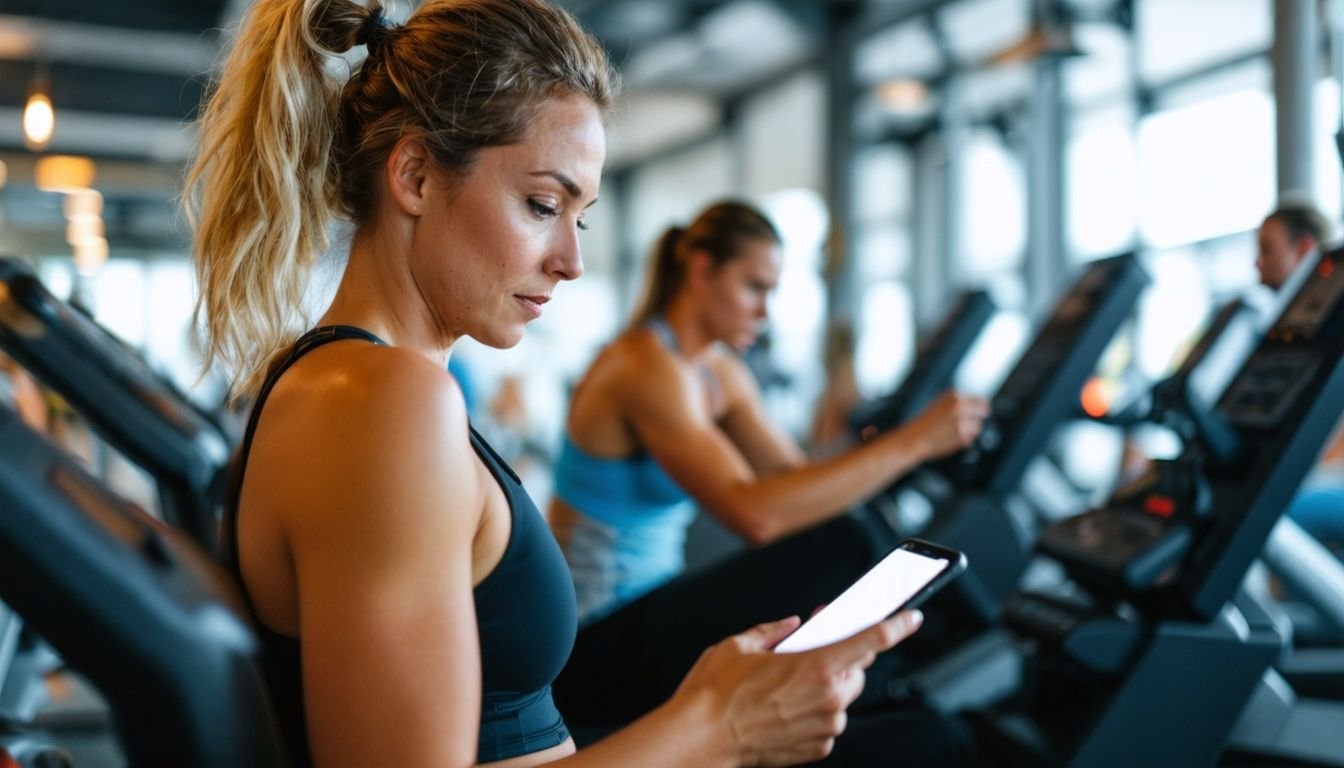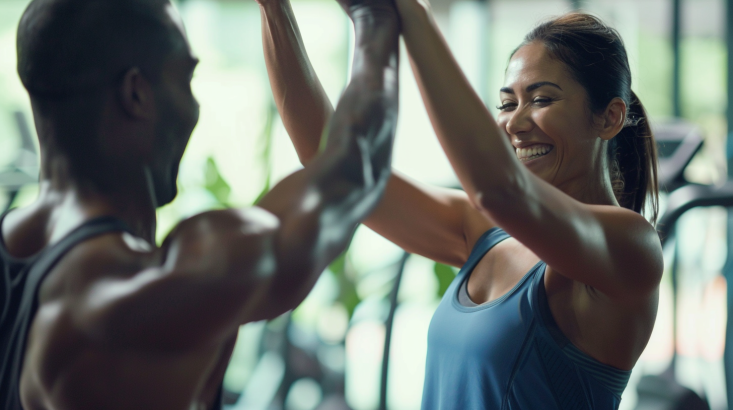Are you someone who feels intimidated or anxious at the gym? You’re not alone. In today’s fitness culture, the pressure to conform to beauty standards and the focus on competition and comparison can contribute to feelings of gym intimidation. This toxic environment can have detrimental effects on both mental and physical health. Social media also plays a role in perpetuating these feelings of inadequacy.
There are ways to combat gym intimidation by creating a safe and inclusive environment, challenging beauty standards, and promoting support and collaboration over competition. Join us as we explore the impact of gym intimidation and how we can work together to create a more positive and empowering fitness community.
What is Gym Intimidation?
Gym Intimidation refers to the feelings of fear, inadequacy, or discomfort experienced by individuals in fitness settings due to various factors such as judgment, comparison, and exclusion.
These forms of intimidation are often exacerbated by societal pressures that dictate what the ideal body should look like, instilling a sense of insecurity in those who do not conform to these standards. Toxic behavior, such as body shaming or making disparaging remarks, further contributes to creating a hostile environment.
Negative body image, fueled by constant exposure to unrealistic beauty standards on social media, also plays a significant role in fostering feelings of inadequacy and unworthiness. When individuals are subjected to bullying or judgmental attitudes at the gym, it can have long-lasting psychological effects and deter them from pursuing their fitness goals.
The Culture of Fitness and Its Impact on Gym Intimidation
The culture of fitness plays a significant role in shaping gym intimidation, as societal norms, body image ideals, and stereotypes can create an environment that fosters feelings of insecurity and exclusion among individuals.
How Does the Pressure to Conform to Beauty Standards Contribute to Gym Intimidation?
The pressure to conform to unrealistic beauty standards within fitness culture can significantly contribute to gym intimidation, creating a hostile environment where individuals feel judged, insecure, and inadequate.
This internalization of societal beauty ideals can fuel a sense of inadequacy, leading individuals to engage in harmful comparisons with others at the gym. The fear of scrutiny and discrimination based on physical appearance can further exacerbate feelings of insecurity, perpetuating a cycle of self-doubt and body-shaming. Such toxic dynamics not only hinder personal growth and confidence but also contribute to a culture of exclusivity and prejudice within fitness spaces.
How Does the Focus on Competition and Comparison Contribute to Gym Intimidation?
The emphasis on competition and comparison in fitness settings can exacerbate gym intimidation by fostering an environment of peer pressure, performance anxiety, and negative self-evaluation among individuals.
This culture of competition often leads to individuals constantly measuring themselves against others, feeling inadequate, and experiencing heightened levels of stress. The prevalence of comparison in gyms can create a toxic atmosphere where individuals are more focused on outdoing others than on their personal progress.
This constant comparison not only affects one’s self-esteem but also fuels feelings of insecurity and judgment towards oneself and others. The pressure to perform and the fear of not meeting standards set by peers can result in increased anxiety and decreased motivation, ultimately impacting one’s mental well-being negatively.
The Effects of Gym Intimidation on Individuals
Gym intimidation can have profound effects on individuals, impacting both their mental and physical health, as well as overall well-being. It can influence behavior patterns, self-esteem, and feelings of empowerment or acceptance.
How Does Gym Intimidation Affect Mental Health?
Gym intimidation can significantly impact individuals’ mental health by contributing to feelings of insecurity, low self-worth, and heightened stress levels, often resulting from discrimination, bullying, and negative stereotypes prevalent in fitness environments.
This negative environment of gym intimidation can lead individuals to question their own value and worth, fostering a cycle of self-doubt and anxiety. The fear of judgment and criticism can erode one’s self-esteem and make them reluctant to participate in physical activities, affecting their overall well-being.
By promoting healthy self-esteem and combating stereotypes within fitness spaces, individuals can feel empowered to embrace their unique qualities and feel more comfortable in their bodies. Creating a supportive atmosphere in gyms can be instrumental in cultivating a positive mindset and improving mental health outcomes for all participants.
How Does Gym Intimidation Affect Physical Health?

The impact of gym intimidation on physical health can manifest through barriers to achieving fitness goals, altered exercise behaviors, and potential non-compliance with health standards, often exacerbated by issues like gender bias and inadequate gym etiquette.
These challenges not only deter individuals from fully embracing their exercise routines but also contribute to feelings of unease and self-consciousness while working out.
Gender bias can further complicate matters, with some individuals feeling judged or excluded based on stereotypes or societal expectations.
To combat these negative effects, it is crucial for gyms to foster a supportive and inclusive environment that encourages all individuals to pursue their fitness goals without fear of intimidation or discrimination.
The Role of Social Media in Gym Intimidation
Social media plays a pivotal role in perpetuating gym intimidation by amplifying unrealistic body image standards, fostering a culture of constant comparison, and influencing individuals’ fitness goals and behaviors through social interactions, often resulting in detrimental psychological effects driven by peer influence.
How Does Social Media Contribute to the Pressure to Look a Certain Way at the Gym?
Social media exerts pressure on individuals to conform to specific body image ideals at the gym, influencing their fitness goals, perpetuating misconceptions about health and exercise, and challenging notions of body positivity and self-acceptance within social norms.
This digital landscape often showcases curated, edited images of seemingly flawless bodies, fostering an environment where comparison and self-doubt are prevalent. As individuals scroll through their feeds, they encounter filtered representations of fitness journeys and workout routines, leading to unrealistic expectations about their progress. This constant exposure can create feelings of inadequacy and dissatisfaction with one’s body, potentially hindering their motivation to engage in healthy activities.
Amid this sea of idealized images, there are growing efforts to promote body positivity and self-acceptance, emphasizing that true fitness is about overall well-being and strength, rather than adhering to a narrow definition of beauty.
How Does Social Media Contribute to the Comparison Culture in the Fitness World?
Social media cultivates a culture of comparison within the fitness world, fostering judgmental attitudes, heightening competition, triggering feelings of insecurity and impacting individuals’ self-worth, often leading to detrimental psychological effects influenced by peer pressure.
This comparison culture driven by social media platforms can create a continuous cycle of self-evaluation and comparison as individuals constantly measure themselves against the seemingly flawless images and achievements of others in the online fitness realm.
The pressure to attain unrealistic beauty standards and showcase one’s progress online can exacerbate feelings of inadequacy and fuel a sense of competition that may overshadow the initial intent of health and well-being.
These influences can lead to a negative impact on mental health, reinforcing the need to cultivate a more supportive and encouraging environment within online fitness communities.
How to Combat Gym Intimidation
Combatting gym intimidation requires fostering an environment of inclusivity, empowerment, and support, where individuals can thrive in a positive and encouraging community that values personal development, wellness practices, and positive reinforcement.
Creating a Safe and Inclusive Environment at the Gym
Establishing a safe and inclusive environment at the gym involves promoting inclusivity, empowerment, and acceptance, fostering respect, encouragement, and trust among members, and facilitating effective communication to build a supportive wellness-focused community.
By actively encouraging individuals to embrace diversity and practice understanding, gyms can create an atmosphere where everyone feels valued and respected. Open dialogues and feedback mechanisms play a crucial role in addressing concerns and ensuring that all voices are heard. Celebrating each person’s unique journey towards wellness and recognizing their achievements can further boost morale and motivation within the gym community. Ensuring that all members feel supported and empowered can lead to not only physical but also mental and emotional well-being for everyone involved.
Challenging Beauty Standards and Promoting Body Positivity in the Fitness Community
Challenging beauty standards and promoting body positivity within the fitness community are essential steps towards empowering individuals, fostering self-esteem, encouraging self-acceptance, and promoting holistic wellness practices that support personal growth.
By embracing diversity and celebrating individuality, the fitness community can create a supportive environment where every body type is valued. Encouraging assertiveness and self-expression allows individuals to define beauty on their terms, breaking free from unrealistic societal norms.
It’s crucial to shift the focus from achieving a certain look to prioritizing overall health and well-being. Incorporating mindfulness, self-care routines, and positive affirmations can help cultivate a mindset of self-love and appreciation for one’s unique qualities.
Encouraging Support and Collaboration instead of Competition and Comparison

Encouraging support and collaboration over competition and comparison in the gym setting can foster a supportive community that values teamwork, encourages empathy and collaboration, boosts social confidence, and focuses on individual achievement and progress monitoring.
This type of inclusive environment not only enhances the overall gym experience but also creates a space where individuals feel supported, motivated, and connected.
Acknowledging and celebrating each person’s progress and milestones plays a vital role in boosting morale and creating a sense of accomplishment.
By prioritizing collaboration over competition, gym-goers are more likely to build strong relationships, trust each other’s abilities, and push one another towards their fitness goals in a positive and encouraging manner.





